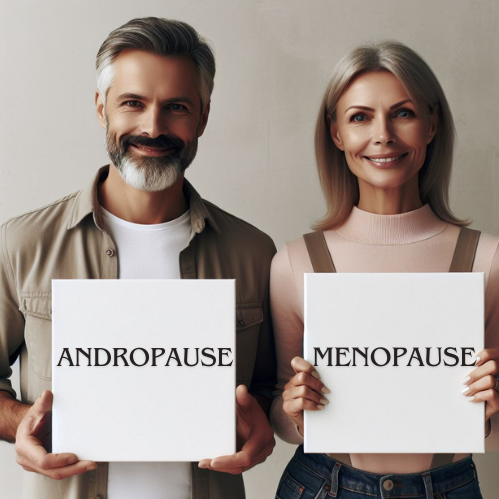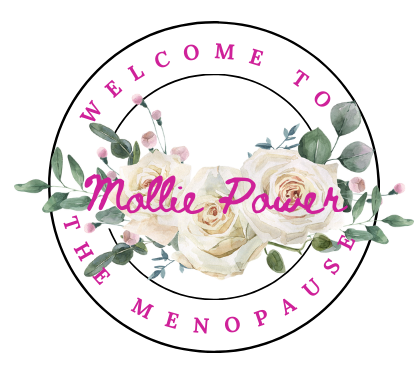
As I take stock of the natural transitions that affect us with aging, the concepts of Andropause and Menopause stand out. They represent more than just medical terms; they signal a time of change that practically every adult may encounter.
Starting with Andropause, it’s often considered the male counterpart to Menopause, labelled inaccurately as ‘Male Menopause.’ However, it’s a phase characterised by a reduction in testosterone levels as men age, usually noticeable in their 40s or 50s. A misconception is that it mirrors Menopause on a one-to-one basis, but it’s different, not least because men can still reproduce during this phase.
Turning to Menopause, this marks the cessation of a woman’s menstrual cycles and with it, her reproductive years. It typically takes place between 45 to 55 years of age. Unlike Andropause, it is a clear-cut end to fertility and has associated symptoms that impact a woman’s quality of life quite pronouncedly.
I find it crucial to acknowledge the importance of these transitions beyond their physical symptoms. For both men and women, understanding the process is the first step towards managing and adapting to these inevitable changes with grace and awareness.
Hormonal Shifts: The Underlying Processes of Andropause and Menopause
My aim here is to shed light on the hormonal changes that Andropause and Menopause bring and how they impact both men and women. Understanding these shifts is essential, as they are more than just markers on the timeline of life; they are closely intertwined with our well-being.
Focusing on Andropause first, it’s important to know that this is not an abrupt change but a gradual one. A man’s testosterone levels typically decline about 1% per year starting in his 30s or 40s. This decrease can lead to several symptoms that might subtly affect daily life including changes in energy levels, mood variations, and alterations in physical health like muscle mass and bone density.
Similarly, Menopause doesn’t occur overnight. A woman’s body begins to produce less oestrogen and progesterone in the years leading up to menopause, a period known as perimenopause. Unlike the slow decline seen in Andropause, these hormonal levels can fluctuate significantly, contributing to a more pronounced set of symptoms commonly associated with Menopause.
The hormones in question do more than just regulate reproductive functions; they play a key role in maintaining homeostasis in the body. Thus, the changes in these levels can have a ripple effect on other bodily systems, underscoring the need for healthcare guidance during these phases.
While endocrine disruption is at the core of both Andropause and Menopause, science has delved into symptom management and overall hormonal balance to help mitigate adverse effects. By recognising and validating the challenges posed by these transitions, individuals can seek the help they need to maintain a sound quality of life.
Experiencing the Transition: Symptoms of Andropause vs. Menopause
Identifying the signs of a significant hormonal shift is crucial for managing Andropause and Menopause effectively. For men, Andropause typically brings about a set of challenges that may not always be immediately apparent. You might notice a gradual reduction in energy, an uncharacteristic sense of fatigue despite adequate rest, or perhaps more difficulty in maintaining muscle mass. This phase can also introduce emotional symptoms, such as irritability or a struggle with concentration that wasn’t there before.
Erectile dysfunction is another telling sign that mirrors these hormonal changes. It’s important to understand that these symptoms reflect a natural decline in testosterone rather than any personal failing. Addressing these issues openly with healthcare providers is a step toward maintaining quality of life and ensuring that any treatment plan is tailored to individual needs.
On the other side, women going through Menopause often experience telltale hot flashes, with heat that seems to emanate from nowhere, leading to discomfort and sleep disruptions. Night sweats may follow, disrupting sleep patterns further and impacting daily functioning. Vaginal dryness and mood swings can also pose significant challenges, affecting personal relationships and overall well-being.
Moreover, Menopause is not just about managing discomfort; it’s tied to longer-term health concerns as well, particularly bone density. As oestrogen levels drop, the risk for conditions like osteoporosis increases, underlining the need for bone health monitoring and prevention strategies.
As we move into discussing the psychological impact of these transitions, it’s clear that the symptoms extend beyond the physical. They colour our emotional world and have the potential to reshape our self-image and relationships. Up next, I’ll outline the emotional journey that accompanies these hormonal shifts and provide insights into managing the psychological aspects effectively.
Navigating Emotional Turbulence: Psychological Impacts of Hormonal Changes
As charts and numbers often fall short in capturing the full human experience, discussing the psychological impact of hormonal changes is not just important; it’s essential. Emotional well-being is intricately connected to these shifts, and the experiences for men and women can widely vary.
In the case of Andropause, imagine the frustration that may accompany a sudden drop in productivity at work or the confusion that sets in when a once-passionate hobby now barely ignites interest. It’s not just about the physical symptoms like decreased muscle mass. Men might grapple with feelings of irritability and sadness or a noticeable dip in self-confidence, sometimes leading to depression. Acknowledging these emotions and their link to hormonal changes is a critical step.
For women, Menopause is more than the cessation of menstruation. It’s a period that can stir a complex mix of feelings. Some grapple with mood swings that make a typical day seem like an emotional rollercoaster. Others may feel a profound sense of loss, as if a definitive part of their identity is shifting. Anxiety is not uncommon, and for many, there’s a tangible grief that accompanies the end of their reproductive years. The psychological aspect, for both menopause and andropause, can affect personal relationships, self-image, and even career.
So, what can be done? Building emotional resilience is key. It’s about reaching out for social support, seeking therapy when needed, and understanding these responses are normal parts of these life stages. Properly addressing these psychological factors sets the stage for effective treatment and a smoother transition into the subsequent chapter of life.
Empowering Through Treatment: Addressing Andropause and Menopause
When you or someone you care about face Andropause or Menopause, knowledge becomes a powerful tool. Recognising that these are natural, albeit sometimes challenging, phases of life pave the way for empathy and self-care. Treatment options for Andropause often revolve around testosterone replacement therapy, but it’s not the sole avenue. Exercise, diet, and even counselling can play pivotal roles in improving quality of life.
In the same vein, Menopause, despite being an end to the fertility chapter, isn’t an end to wellness or vitality. Hormone replacement therapy can alleviate many of its symptoms, and there’s a wealth of non-hormonal options too. Lifestyle adjustments, herbal supplements, and a proactive approach to symptom management can make a significant difference.
What stands out is the range of options available. Medical advancements mean treatments are MORE ACCESSIBLE and TAILORED to an individual’s needs than ever before. It underscores the importance of consulting healthcare professionals to navigate these transitions effectively.
Ultimately, both Andropause and Menopause are calls to action—a prompt to pay greater attention to one’s body, to embrace change, and to adapt with care. With a focus on maintaining hormonal balance and managing symptoms, you can continue to lead a fulfilling life. Empowerment comes from the understanding that while these transitions are complex, they also offer a chance for rejuvenation and self-discovery.
